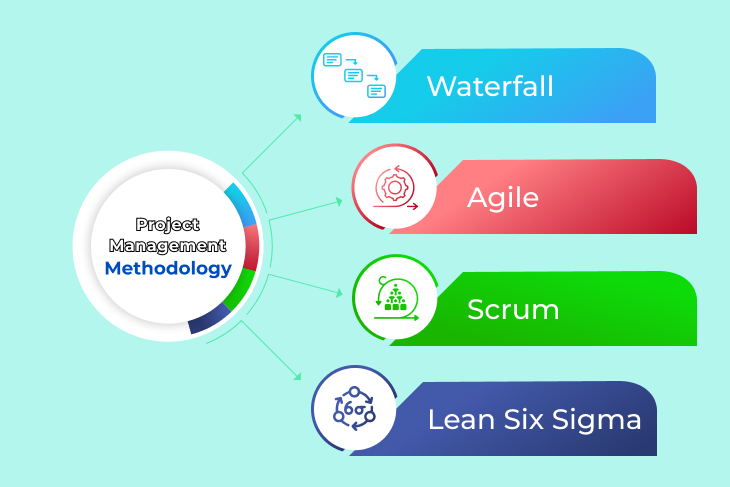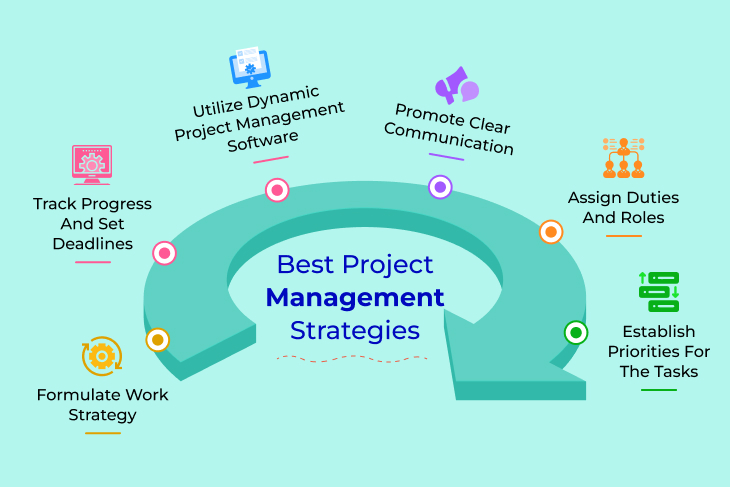Project management methodology

Project management methods are a standard set of practices that project managers and their teams follow throughout the development life cycle. Thus, to guarantee that projects are finished on time, and to the client’s satisfaction, these methodologies provide a structured approach to managing projects.
- Waterfall: It is the oldest project management approach. Each step of the project is finished before proceeding to the next one. It comprises several stages such as gathering and analysis, design, implementation, testing, deployment and maintenance. Though the waterfall methodology is widely used, it lacks the adaptability of alternative approaches and may not be the best choice for complicated or uncertain projects.
- Agile: Agile is a flexible method that focuses on teamwork and adaptation. It entails breaking down a long list of goals into smaller, more manageable pieces that your team can complete in a reasonable time frame. Furthermore, it emphasizes the importance of teamwork, open communication, early delivery, and flexible solutions.
- Scrum: It is an agile methodology for managing projects. Scrum divides the duration of a project into sprints of work that run between one and two weeks. During a sprint, a Scrum Master guides a small team through the process of planning, executing, and reviewing the previous sprint’s work.
- Lean Six Sigma: It is one of the project management methods that is a combination of lean and Six Sigma. This method helps in reducing errors and unnecessary spending. Its end goal is to increase quality while cutting expenses and streamlining operations. Even though Lean Six Sigma is most often associated with the manufacturing industries, it can be implemented in any field. There are five steps in the methodology: define, measure, analyze, improve, and control.
Lastly, project managers need to consider the advantages and disadvantages of each approach and choose the one that works best.
Best project management strategies

You may avoid missing project deadlines and meet your goals by creating a realistic project plan, assigning clear duties and roles, establishing clear communication, monitoring progress and revising it as needed. Let’s explore a few project management strategies in detail.
- Utilize dynamic project management software: If you want to manage your projects more effectively, software designed for that purpose is a great investment. You can monitor development, delegate work, and keep everyone in the cycle with the help of project management software. One of the project management solutions is Alian Hub which can adapt to any team size or project complexity with ease because of its scalability, adaptability, and user-friendliness. Kanban boards, calendars, reports, to-do lists, workload management, and timesheets are some of the powerful features of this project management tool. Furthermore, you can customize the status and visualize the progress of the tasks.
- Formulate work strategy: Lack of proper preparation is often one of the leading causes of missed deadlines. You need to design a workable strategy for the project if you want to guarantee to finish it on time. A thorough understanding of the project’s scope, milestones, timeframes, and finance should be an integral part of any excellent project plan. Additionally, it has to anticipate potential risks and establish backup strategies for dealing with them.
- Assign duties and roles: In order to successfully manage a project, it is essential that you clearly assign tasks and roles to each member of the team. Every member of the team has to be aware of their position in the project as well as the responsibilities that come with it. This helps to reduce misunderstanding, wastage of time and duplication of work.
- Promote clear communication: One of the most important aspects of project management is keeping everyone engaged and updated. The success of every team relies on its members’ ability to communicate effectively with one another. This involves holding meetings frequently, reporting on progress, and discussing the results.
- Establish priorities for the tasks: Another project management strategy entails establishing priorities for the tasks. By assigning priority to tasks, one may guarantee that the most important jobs are finished first, hence lowering the likelihood of missing deadlines. Using tools such as Alian Hub, which allows you to organize jobs according to their level of priority and urgency, is one way to help you prioritize your work.
- Track progress and set deadlines: To fulfill project deadlines, you must constantly monitor progress and make required adjustments to your strategy. Having regular updates and reports on progress can allow you to see any issues or delays early on before they grow into major setbacks. Furthermore, it is crucial to set reasonable deadlines. Teams perform worse when they are under additional pressure, such as that caused by unrealistic deadlines. Realistic timelines can only be established after careful consideration of the project’s scope, available resources, and team’s capabilities.
Conclusion
By following the above-mentioned project management strategies and using project management solutions like Alian Hub, project managers can increase their chances of finishing projects on time. This allows them to avoid the negative repercussions that come with missing deadlines.

